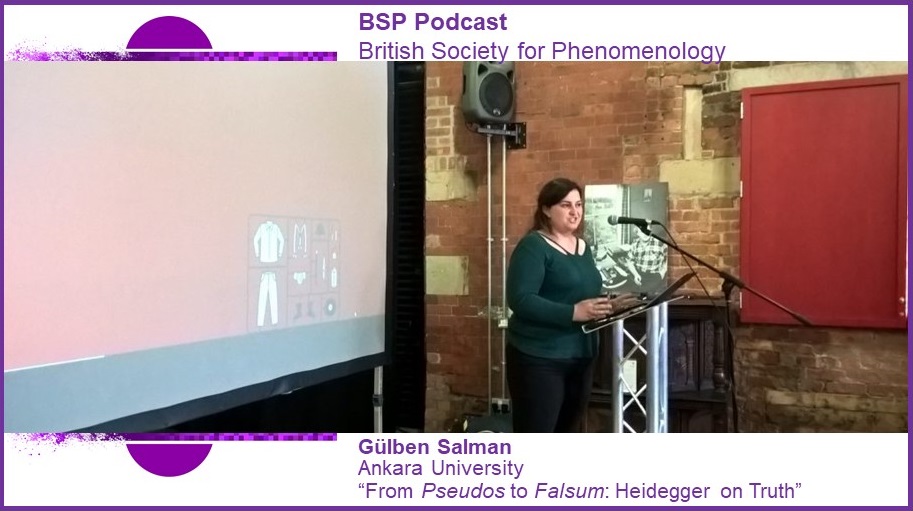The next episode of season four of our podcast continues with a presentation taken from our journal’s 50th Anniversary Conference.
Season 4 episode 73: 8 June 2020
We continue season four of the British Society for Phenomenology Podcast with a paper from Gülben Salman (Ankara University). This recording comes from the JBSP 50th Anniversary Conference: On the History of Being – After the Black Notebooks (2019) which was held in celebration of fifty years of the Journal of the British Society for Phenomenology.
Gülben Salman: ‘From Pseudos to Falsum: Heidegger on Truth’
You can listen to this episode on the BSP’s Podbean site, and you can also find it on iTunes and all good podcasting apps by searching ‘BSP Podcast’.
ABSTRACT: Following the period when the first Black Notebooks were written (1931-1941), Heidegger delivers a class on Parmenides and Heraclitus at the University of Freiburg (1942-1943). The lecture notes of this class were later published under the title Parmenides. In his Black Notebooks one can see that he had been contemplating common concepts like beginning, truth, concealment/unconcealment, mythos/logos, oblivion, science, etc. It seems rewarding to consider as complementary his lecture notes on Parmenides and his Ponderings in order to understand thoroughly the question of the history of being. It is important because he claims that “philosophy creates the concealment” and tries to “keep itself hard to the wind of its own storm”. This is visible in the class of 1942, when Heidegger makes a distinction between pseudos and its misleading Roman translation as falsum. For him, these are two different ways of understanding what does not belong to the realm of truth. He later indicates that the polis is the realm of aletheia/pseudos, while on the other hand the veritas/falsum distinction is a part of a Roman imperial mindset. This presentation will elaborate Heidegger’s ideas about the Greek and Roman way of thinking “wrong” in accordance with his Ponderings. There is a change in the essence of truth, and this can be made visible in the order of the polis and the imperial organization of the Roman political milieu as res publica. Heidegger is quite interested in the confrontation with antiquity, “the beginning” in a different nuance than its modern version. This chasm clarifies the transformation in the History of Being.

Journal of the British Society for Phenomenology: Special Issue – Heidegger and the Black Notebooks (Volume 51, Issue 2, 2020). Other papers presented at the JBSP 50th Anniversary Conference have been reworked and published as essays in this special edition.
The JBSP 50th Anniversary Conference: On the History of Being – After the Black Notebooks (2019) celebrated 50 years of the journal. The British Society for Phenomenology held a three-day conference at the International Anthony Burgess Foundation, Manchester, UK from 31 May to 2 June, 2019. The aim of the event was to examine the contribution of Heidegger’s Schwarze Hefte (Black Notebooks) to an understanding of the question of the history of being.
The British Society for Phenomenology is a not-for-profit organisation set up with the intention of promoting research and awareness in the field of Phenomenology and other cognate arms of philosophical thought. Currently, the society accomplishes these aims through its journal, events, and podcast. Why not find out more, join the society, and subscribe to our journal the JBSP?

